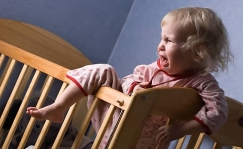
Irregular bedtimes may disrupt healthy brain development in young children, according to a study of intelligence and sleeping habits.
Going to bed at a different time each night affected girls more than boys, but both fared worse on mental tasks than children who had a set bedtime, researchers found.
Little is known about the links between the time that young children go to bed and their cognitive development. This research paper, sought to examine whether bedtimes in early childhood are related to cognitive test scores in 7-year-olds.
The findings on sleep patterns and brain power come from a UK study of more than 11,000 seven-year-olds.The findings are published in the Journal of Epidemiology and Community Health.
Published: October 13, 2012
 A new study from Lancaster University has found that sleeping on a problem really can help people to find a solution.
A new study from Lancaster University has found that sleeping on a problem really can help people to find a solution.
The study, published online this week in the journal Memory & Cognition, tested whether sleep or time spent awake worked best in helping people find the solutions to a range of problem solving tasks.
Participants in the study – 27 men and 34 women – were asked to attempt easy and difficult verbal insight problems and, following a period of sleep, time spent wake, or no delay at all, the three groups of participants reattempted previously unsolved problems.
The sleep group solved a greater number of difficult problems than did the other groups, but no difference was found for easy
problems.
The authors of the study – Ut Na Sio, Padraic Monaghan and Tom Ormerod all from the Centre for Research in Human Development and Learning at Lancaster’s Department of Psychology – concluded that sleep facilitates problem solving but this has its primary effect for harder problems.
Professor Padraic Monaghan said: “We’ve known for years that sleep has a profound effect on our ability to be creative and find new solutions to problems. Our study shows that this sleep effect is greatest when the problems facing us are difficult. Sleep appears to help us solve problems by accessing information that is remote to the initial problem, that may not be initially brought to mind. Sleep has been proposed to ‘spread activation’ to the solution that is initially distant from our first attempts at the problem. The advice stemming from this and related research is to leave a problem aside if you’re stuck, and get some sleep if it’s a really difficult problem.”
Source:Lancaster University
To read the study go to
http://www.springerlink.com/content/7802xn5815616nwl/?MUD=MP
 Tired? Scientists have discovered another possible benefit of a night of restful and uninterrupted sleep.
Tired? Scientists have discovered another possible benefit of a night of restful and uninterrupted sleep.
According to a new study led by researchers at the Johns Hopkins Bloomberg School of Public Health fragmented or interrupted sleep could predict future placement in a nursing home or assisted living facility. The study is featured in the July 2012 issue of the Journal of the American Geriatrics Society and outlines the association between objectively measured sleep and subsequent institutionalization among older women.
“Sleep disturbances are common in older people,” said Adam Spira, PhD, lead author of the study and an assistant professor with the Bloomberg School’s Department of Mental Health. “Our results show that in community-dwelling older women, more fragmented sleep is associated with a greater risk of being placed in a nursing home or in a personal care home. We found that, compared to women with the least fragmented sleep, those who spent the most time awake after first falling asleep had about 3 times the odds of placement in a nursing home. Individuals with the lowest sleep efficiency—those who spent the smallest proportion of their time in bed actually sleeping—also had about 3 times the odds of nursing home placement.” The authors found similar patterns of associations between disturbed sleep and placement in personal care homes, such as assisted-living facilities. Sleep duration per se did not predict placement in either of these settings.
According to the Centers for Disease Control and Prevention, insufficient sleep is associated with a number of chronic diseases and conditions—such as diabetes, cardiovascular disease, obesity and depression. In addition, insufficient sleep is associated with the onset of many diseases and is responsible for motor vehicle and machinery-related crashes. Previous studies have also linked disturbed sleep with disability in older adults and impairment in activities of daily living and mobility. [continue reading…]
Published: April 16, 2012

 A new study from Lancaster University has found that sleeping on a problem really can help people to find a solution.
A new study from Lancaster University has found that sleeping on a problem really can help people to find a solution.
